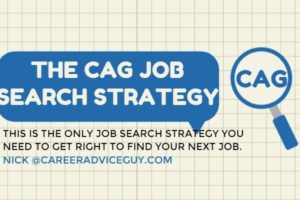The internal job search is probably the most relevant job search strategy to focus on if you’re out of work. The problem with the internal job search strategy, you need to be already working for a company. This rules out 75% of job seekers, who already have a job, and are secretly looking. It also rules out the 20% of job seekers, who do not think outside the box. Realistically, only 5% of job seekers will ever think about or use this job search strategy.
Remember, just because people don’t use this job search strategy, does not mean it not it’s not right. In my opinion, most people don’t use this strategy because they cannot think outside the box and are focused too heavily on securing the perfect full-time role.
What is the Internal Job Search Strategy?
The idea behind this strategy is simple. You’re going to get a temporary job in a large multi-national company. Once you’re in the door, you’re going to network like crazy to find a job that you want using a few tried and tested strategies, that have proved successful in the past.
Hiring managers worst fear is that they hire a candidate who does not fit in, or worse still, they hire a candidate who upsets the dynamics of the current team. Hiring for a position is a very complicated task, yes there are competency-based interviews, references and personal judgment, but every hiring manager has made hiring mistakes in the past.
As a hiring manager, if you see a candidates work, or get a reference from someone you know well, who has worked with the candidate, this can be the difference between a successful hire and not.
Temping & Contracting
One of the best ways to get into a company is through temping or contracting. Both are very similar, with the idea you are hired by a company on a short-term contract. Temping or contracting allows hiring managers to view your personality, work ethic, and knowledge first-hand, with very little commitment from the company.
If a company offers a candidate a temporary job for one month and the candidate does not fit the position, at worst, the company has only lost one month’s salary.
For a hiring manager, this means they can take risks on who they hire and are more likely to hire you for a role they’re not 100% sure you’re going to be suitable for but would like to give it a go. If it does not work out, they can quickly move onto other candidates.
For candidates looking for a new job, this can be a great way into a company while allowing you to prove your skills, knowledge, and experience to the hiring manager. If you perform well, you will likely be the only candidate they think about for the role.
Temping and Contracting also allows you to quickly meet and network with a whole new selection of hiring managers. This means that if an internal job is not available within the company, you now have an entire selection of hiring managers that could give you a reference and may be able to put you in contact with someone they know who is hiring.
Two Job Offers
The idea is that while you’re in the company, you look out for positions that could be suitable, but it’s also possible to take this a step further by using that hiring manager as a direct reference. Recently I have been working with a candidate who adopted this method to the extreme and ended up with three job offers, from one short-term contract.
- First Job Offer – The candidate worked hard, proved himself with his knowledge and experience, and ended up getting a job offer from the hiring manager.
- Second Job Offer – The candidate networked within the department and ended up getting a job offer in another department.
- Third Job Offer – The candidate was initially told there were no full-time positions available this year, and thus could interview elsewhere. He took this to the extreme because he used the hiring managers contacts, to find a third role. He was successful because he had a reference. If you have a personal recommendation, you can be sure you’re going to be interviewed.
How to Get A Contracting Job?
Getting a job as a contractor is quite simple, but you need to ask for it, as contractor jobs are unlikely to come to you. Generally, there are three places to find a contractor role, recruitment agencies, contractor specific job boards, and company websites.
Recruitment Agencies
I would estimate 60-70% of all contractor jobs are given to recruitment agencies directly. You need to understand, hiring a contractor for a one-month job is expensive, and this means its essential to the company. If it is critical, the company want it today. Recruitment agencies have the ability to provide candidates in a short period. Over the years, I have had candidates interview for a contract role one day and start the next.
When you’re searching for recruitment agencies, remember they will both specialise in a specific sector, and level. It’s very easy to send your CV to fifty recruiters and not receive a single reply. This is often not because of your CV; it’s because you have approached the wrong recruiter.
Contractor Specific Job Boards
There are literally thousands of job boards across the internet covering every different possible job from cleaners and security guards, to teachers, and from sales managers to finance directors. And then, there a contractor specific job boards.
With any job board, you either need use “dedicated filters” to filter contract only roles, or use “contractor” as a keyword for your searches, and run searches for “Sales Manager contractor” as an example.
One Point, remember, Google.co.uk is a job board in itself and works well. You can easily add a Boolean search to the Google search bar, to view roles. As an example, “Sales Manager AND London AND Contractor“, brings up a long list of relevant jobs, not only from job boards but also recruitment agencies.
Company Websites
This is a much more time-consuming method to find roles, but its often the best route as companies will put their contract positions online. I would probably stay away from small and medium companies where hiring is limited. Still, with large multi-national companies that are always hiring in one form or another, there will be roles the internal recruiters are sourcing for.
Remember, most candidates will not make an effort to search for roles directly given the effort required. As a result, if you can find positions directly, you’re in the best possible place to be interviewed for those roles.
The Step Down Or Step-Sideways
Contracting is a great option to get into a company and prove your worth. But remember, contracting is often a short-term contract, where you’re being brought in to a company to complete a job. It’s not your final career, and it’s very unlikely, you will be spending more than a couple of months doing it.
For this reason, it doesn’t need to be perfect. It’s perfectly okay to take a step-downwards or a step side-ways. What’s important, you’re in the company, and building your reputation. One Point, there is no point in applying for positions that you could do in your sleep. Taking a step side-ways or a slight step down is one thing, but if you’re currently Head of Sales and you’re applying to junior sales roles, you’re unlikely to be successful with your application.
Final Thoughts
If you apply and are interviewed for a contract role, you need to prepare for your job interview as you usually would, but you also need to understand that contract interviews are very different from permanent interviews.
For a permanent position, the hiring manager wants to know whether you’re going to be able to do the job but also fit into the existing team. For a contract position, you’re being employed to do a job. The only thing the hiring manager wants to know is whether you can do it. If you don’t get on with people, for a hiring manager, it doesn’t really matter as you’re only going to be there for a month.
As a consequence, the best way to approach the interview is to try and understand the hiring managers problems, and explain in detail how you would fix those problems, using your past experience.
Nick Jones
Latest posts by Nick Jones (see all)
- What Job Should I Do? It Depends on Whether You’re An Introvert Or An Extrovert - November 17, 2021
- Ten Ways to Unplug and Recharge During The Holiday Season - November 3, 2021
- 10 Jobs for Teenagers to Earn Extra Money - October 13, 2021








